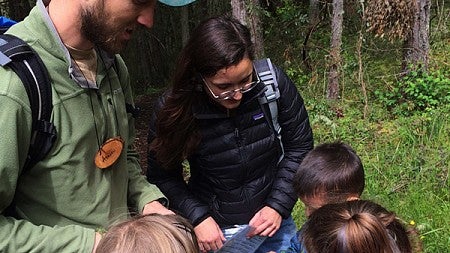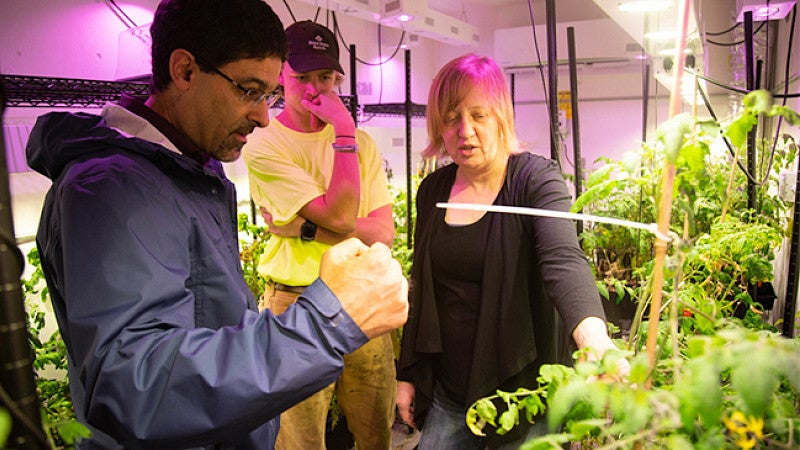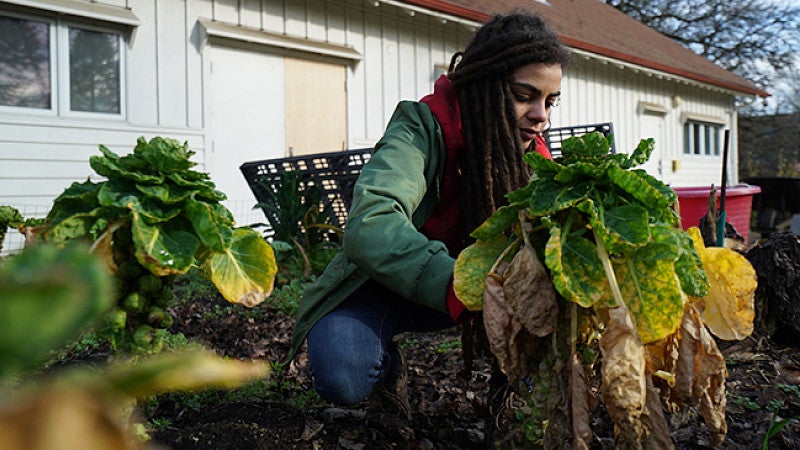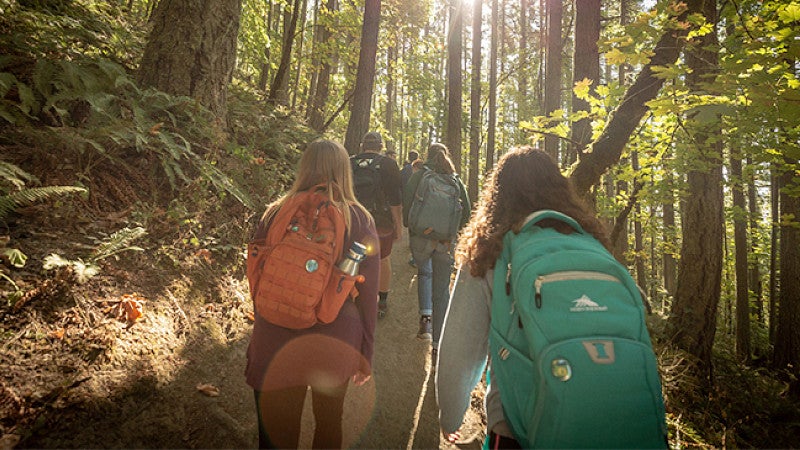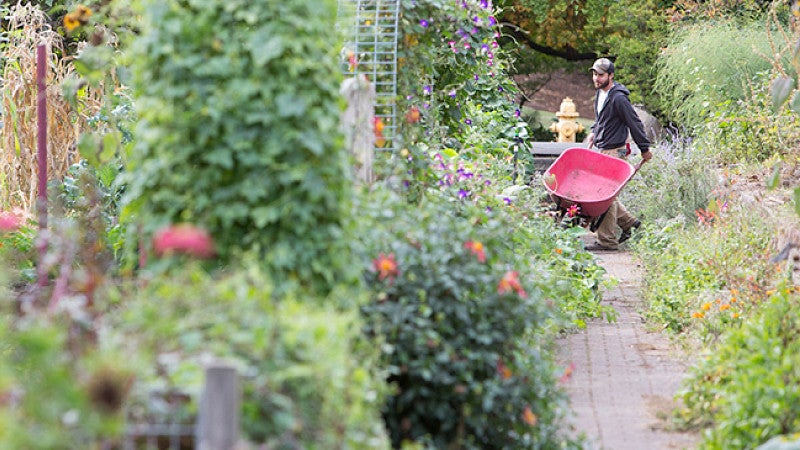By convening scholars from diverse disciplines around shared interests, the Environmental Studies Program is an incubator for remarkable collaborations that generate innovative, renowned research. Conversations that start in our seminars, conferences, meetings, and other events create the foundations for our creative collaborations. Our Interdisciplinary Research Committee provides seed grants to encourage new and emergent research projects.
Featured Programs
The Center for Environmental Futures (CEF) is an interdisciplinary group of faculty and students that reflects a longstanding investment in environmentalism and social justice at the University of Oregon and in the larger Eugene community. Our mission is to encourage faculty and students in interdisciplinary environmental studies research and teaching, to encourage and support members of the community to participate in the University’s environmental studies programming and problem-solving, and to cultivate relationships and build projects to address our most pressing environmental and social problems.
The Environmental Leadership Program is a collaborative, interdisciplinary service-learning program housed in Environmental Studies. We match student teams with non-profit organizations, government agencies and businesses to address local environmental needs. Our students gain leadership, communication, and professional skills by engaging directly in applied problem-resolution while providing valuable assistance to our community partners.
Affiliated Programs
The Office of Sustainability was established in 2007 to help set goals, monitor progress, make policy recommendations, support students, faculty, and staff initiatives, and tell the UO’s sustainability story. Sustainability is about meeting our current resource needs without compromising the ability of future generations to meet their own needs. Because our economy and society are dependent on a healthy environment, sustainability requires balancing economic success with environmental conservation, and social equity, also known as the triple bottom line.
The goal of the Urban Farm is to teach students how to learn about nature through working. The class is offered in spring, summer and fall terms. The activities of the Farm vary seasonally but are primarily hands-on with some lectures and field trips. Students will learn about the importance of caring for the soil, various organic gardening practices and techniques, composting, permaculture, biodynamic agriculture, and agricultural land issues.
The Student Sustainability Center (SSC) is a collaborative space for student-led initiatives that foster the simultaneous pursuit of human equity, environmental vitality, and economic well-being in the present and future. Through our efforts, we hope to help students develop the skills, strategies, and networks necessary to work towards their vision of society.
Affiliated Centers and Institutes

Just Futures Institute for Racial and Climate Justice
A home for applied, publicly engaged research that addresses the intertwined issues of racial inequality and climate crisis in innovative ways. A $4.52 million grant from the Andrew W. Mellon Foundation, which has largely funded the Just Futures Institute, is the largest humanities grant award in UO history.
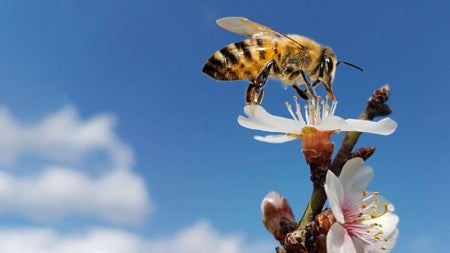
Institute of Ecology and Evolution
The Institute of Ecology and Evolution (IE²) facilitates research and graduate education in ecology and evolutionary biology. The Institute fosters a collegial and stimulating intellectual environment for world-class research in molecular evolution, evolutionary genetics, evolution of development, and microbial, population, community, and ecosystems ecology.
The EDC seeks to educate and inspire University of Oregon design students to have the awareness, sensitivity, and expertise to lead the community toward sustainability. While the EDC's focus is in the design disciplines, we welcome interested students and community members of all fields.
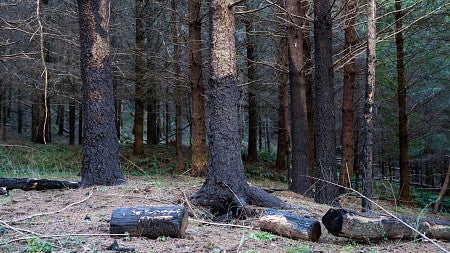
Environmental and Natural Resources Law Center
For more than 40 years, the University of Oregon School of Law’s Environmental and Natural Resources Law Center’s focus on public interest environmental law and commitment to innovations in environmental legal education have made it one of the nation’s oldest and most respected programs.
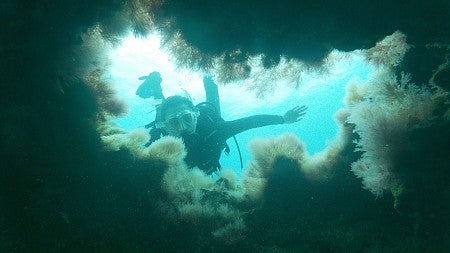
Institute for a Sustainable Environment
Serves as the center for innovative, interdisciplinary research at the nexus of ecological, economic, and social sustainability.
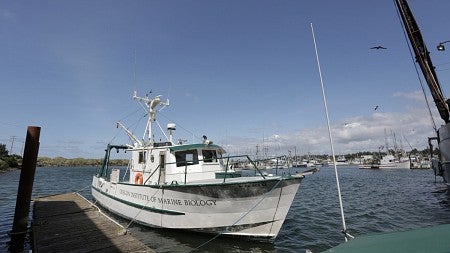
Oregon Institute of Marine Biology
University of Oregon’s marine biology institute. This 100-acre marine station is located in Charleston, Oregon at the mouth of Coos Bay.
Ocean and Coastal Law Concentration
The University of Oregon’s Ocean and Coastal Law Center is now part of the Environmental and Natural Resources Law Center. This program focuses on the intersection between oceanic law and international relations, environmental law, and laws relating to indigenous peoples’ rights.
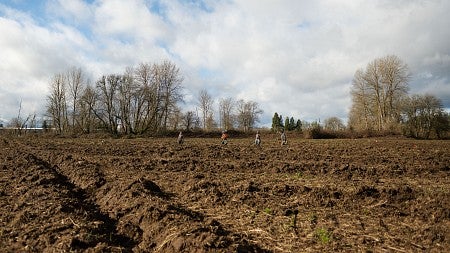
Resource Assistance for Rural Environments
RARE is an AmeriCorps program administered through the University of Oregon’s Institute for Policy Research and Engagement.
Interdisciplinary Student Research Profiles
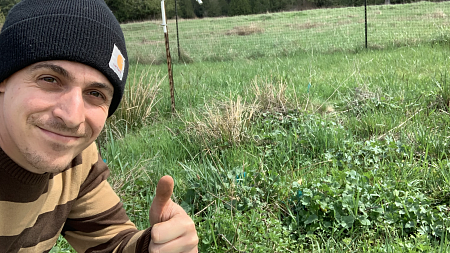
Alejandro Brambila, Environmental Studies PhD program, 2022
Grassland plant community ecology. Restoration and disturbance ecology. Agroecology.
My research focuses on the restoration of grassland plant communities in the Pacific Northwest and California across climate and management contexts. With regards to climate, I am studying how warming affects Pacific Northwest grassland restoration outcomes following fire, and competitive dynamics between native perennial bunchgrasses and introduced annual grasses. My research also considers how to balance productive land uses with management for ecosystem function and biodiversity. This work has taken place in California grasslands grazed by cattle, and in Oregon hazelnut orchards where we are working to restore native prairie communities as cover crops. These projects at the interface of agriculture and ecology require an interdisciplinary understanding of plant responses as well as agricultural imperatives and the needs and perspectives of farmers.
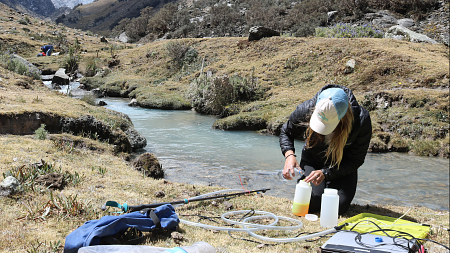
Holly Moulton, Environmental Sciences, Studies and Policy PhD program, 2023
Futuremaking in a Disaster Zone: Indigenous women, climate justice and the everyday politics of climate change adaptation in Peru.
My dissertation uses a qualitative mixed methods approach to understand Indigenous women’s everyday experiences of climate change adaptation in the glaciated Peruvian Andes, and how their experiences are reflected by Indigenous women’s social and environmental movements, state agencies, and multilaterals like the United Nations. I also work with international collaborators in history, glaciology, hydrology, and anthropology to understand local adaptations to changes in glaciers and water, including glacial lake outburst floods, water scarcity, and changing sea ice. Ultimately, my interdisciplinary research seeks to understand the possibilities for transformative climate change adaptation through decolonizing adaptation policy and research in icy places.
Read the published work in Agua Futuro or on the National Science Foundation.
Associated faculty, labs, center or institute:
The Glacier Lab (Mark Carey)
Science, Environment, and Society Lab (Leigh Johnson, Dan Buck, Mark Carey)
Stress, Adaptation, and Resilience Lab (Zachary DuBois)


